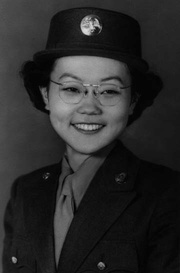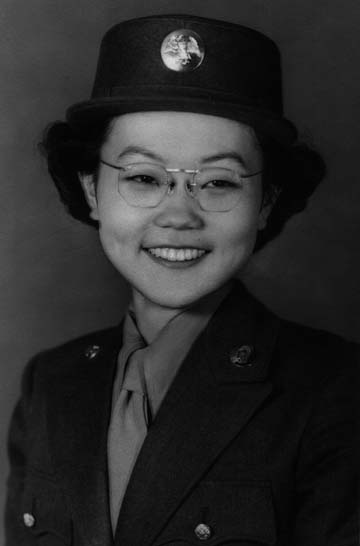
Banco de Dados da Experiência Militar Nipo-Americana

Sue Suzuko "Susie" Ogata
Born in North Platte, Nebraska, Kato grew up in a farming area which included about 25 Japanese families. After she graduated from high school in 1938, the family moved to a farm in Greely, Colorado, a state where Japanese immigrants were allowed to own land, unlike Nebraska or California. An 'assimilated' Nisei, she recalled, 'I talked to my dad in English. He was very Americanized. His dream was to be naturalized as an American Citizen.'
However, she added, 'My dad subscribed to the San Francisco Nichibei Times, so we were exposed to Nisei news. Dad never let us forget we were of Japanese background. He told us that because of our physical looks, we would never be fully Americanized. He said that's why it was important to remember our Japanese heritage. Kato was 'very angry' when Japan attacked Pearl Harbor on Dec. 7, 1941. 'I was just stunned,' she said. 'My brothers were still too young then, and I felt I needed to go,' she explained.
One younger brother joined the Army when he was 19 and served with the 442nd Regimental Combat Team as a replacement for the 100th Battalion troops in Europe. He came back from the war safely, she added. Kato took her basic training at Fort Des Moines, Iowa, before winding up eventually at Fort Snelling. Enlisting in the WACs in 1943, Kato was first assigned, after basic training, to Fort Devins, MA, in the personnel office doing clerical work. 'There were three of us Nisei there,' she recalled. 'We all met at the recruitment office in Denver, where I joined up.' Then in 1945, she was one of several dozen women ordered to Fort Snelling, MN, to form a detachment of Nisei WACs for instruction in Japanese language and military terminology at the Military Intelligence Service Language School. The Nisei girls marched to classes, every day from 9 am to 4 pm, which lasted for eight months. They learned the Japanese language, history, geography, military terminology, and writing - about six different classes. After supper, the women had a compulsory study period of two hours. 'The language training was pretty intense. Everything was in Japanese, five days a week. Saturday morning we had inspection. Then the rest of that day and Sunday we had off,' she said. 'The Hawaiian Nisei WACs who had been recruited - about 20-30 at one time - were very bilingual,' Kato observed. Kato attended a Japanese language school for awhile in Nebraska when she was between 8 and 10 years old, but learned a 'very minimal' amount of Japanese. 'I quit going after I lost my mother when I was 11,' she said. However, she had learned the kanji and retained that knowledge. 'That was the only Japanese training I had,' she stated. Graduating from the language school at Fort Snelling, Kato was sent to Camp Ritchie, MD, in Dec. 1945, where they did translation work.
Subsequently, the entire translating section was moved to the Central Document Center in Washington DC. In the nation's capital, even though the war was over by then, the Nisei WACs translated captured Japanese documents, whether or not they were important. For these young Nisei women, US military life did not reflect American society in general - they perceived no blatant racial discrimination against Japanese Americans. Kato declared that the Nisei were not treated any differently in the military service and she encountered no acts of sexual harassment. There was only one unpleasant exception that Kato remembered. 'It was at Fort Des Moines. There was one Hakujin WAC whose brother was killed by a Japanese sniper. I looked Oriental, so there was instant hatred. One night, she threw out my clothes from my rack, and we had angry words. But some older WACs interceded,' she said. 'Later she tried to make amends, and we even went shopping at the PX. My friends were worried and told me she could have knifed me. But I understood why she felt the way she did, with her brother being killed by a Japanese sniper,' Kato stated. Kato declared that serving in the WACs was a very important part of her life. 'It was very enriching and I formed a lot of friendships - friends for life. It was a learning experience for me. Many people went to college, but I went into the service,' she said. Kato believes she made a contribution to the US war effort. 'I knew they needed WACs to take desk jobs so the fellows could go to the front,' she said. We did it for all Japanese Americans. I was proud to be an American, and I was waving the American flag,' she declared. 'I would do it all over again. I don't regret any part of it.' Kato met her future husband, Minori Kato from Salinas, CA, at Fort Snelling. 'He was a five-year man who joined before Pearl Harbor,' she said. Discharged in 1946, she moved to California in 1950 and worked as a legal secretary in Long Beach until her retirement in 1980. Kato and her husband have lived since 1988 in Canyon Lake, a desert community near Lake Elsinore.


